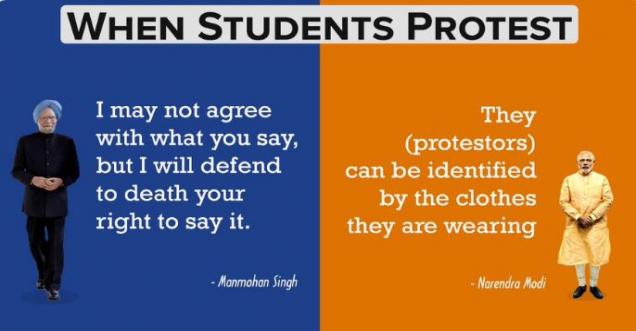
H2: Fact check: Manmohan Singh, I may not agree with what you say, but I will defend to death your right to say it
Fake news claims: A message quoted by Former JNU student leader Umar Khalid stating that ex-PM Manmohan said, “I may not agree with what you say, but I will defend to death your right to say it”
In 2005, Manmohan Singh faced black flags in JNU as a protest against his economic policies. It became big news. The admin immediately sent notices to students. The very next day, PMO intervened & asked the admin not to take any action as the protest was students' democratic right.
In 2005, Manmohan Singh faced black flags in JNU as a protest against his economic policies. It became a big news. The admin immediately sent notices to students. The very next day, PMO intervened & asked the admin not to take any action as protest was students' democratic right.
— Umar Khalid (@UmarKhalidJNU) January 9, 2020
PM Manmohan Singh facing sloganeering and black flags from student protestors began his speech by quoting Voltaire, "I may not agree with what you say, but I will defend to death your right to say it."
PM Manmohan Singh facing sloganeering and black flags from student protestors began his speech by quoting Voltaire, "I may not agree with what you say, but I will defend to death your right to say it."
— Umar Khalid (@UmarKhalidJNU) January 9, 2020
Then and Now!!
Facts Check Verdict: True, but not completely true.
News Verification: Former JNU student leader Umar Khalid shared and quoted the speech of Manmohan Singh stating, “I may not agree with what you say, but I will defend to the death your right to say it”. The words above reportedly originated with an English author named Evelyn Beatrice Hall in 1906. .
Outlook also gave the same text of Umar Khalid version of the text and printed, “"PM Manmohan Singh facing sloganeering and black flags from student protestors began his speech by quoting Voltaire: ''I may not agree with what you say, but I will defend to death your right to say it''.
The Ex-PM has been highly vocal to the right to speech, he might have used these words for the JNU incident and backlash he faced during his time. We don't have any newspaper verification for the same.
The congress twitter handle also stated the same, comparing Manmohan Singh to Narendra Modi. The Congress twitter handle posted, “The measure of a great leader is how he accepts criticism & opposition. Our country is no longer governed by a great leader who has the dignity & maturity to accept critique, our country is run by one that cowers in front of media & sends goons to attack students.”
The measure of a great leader is how he accepts criticism & opposition. Our country is no longer governed by a great leader who has the dignity & maturity to accept critique, our country is run by one that cowers in front of media & sends goons to attack students. #HanikarakBJP pic.twitter.com/ODggmEjVH3
— Congress (@INCIndia) January 11, 2020
Salil Tripathi, pointed this out asking the question, “Don't manufacture quotes, @INCIndia - this quote has been attributed to Voltaire though he didn't say it. If Dr Singh said it, do provide evidence. Leave such fakery to your opponents. cc”
Don't manufacture quotes, @INCIndia - this quote has been attributed to Voltaire though he didn't say it. If Dr. Singh said it, do provide evidence. Leave such fakery to your opponents. cc @AltNews @ShashiTharoor https://t.co/ezoQiu2bci
— Salil Tripathi سلیل تریپاٹھی સલિલ ત્રિપાઠી (@saliltripathi) January 11, 2020
To which the congress provided the information link
We also learn in a University how to deal with differences of opinion. For in expressing one's own opinion freely, we implicitly recognize the right of another to similarly express a different opinion freely. I do sincerely believe that a University is built on the foundation of liberalism. It can never thrive without the assurance of a liberal environment. Every member of a University community, if he or she wishes to aspire to be worthy of the University, must accept the truth of Voltaire's classic statement. Voltaire proclaimed: "I may disagree with what you have to say, but I shall defend, to the death, your right to say it." That idea must be the corner-stone of a liberal institution.
Prime Minister of India - Dr. Manmohan Singh
It is always a delight for me to return to a University campus. My professional life started among students and teachers and I have always enjoyed the environment of a University campus. It is an even greater joy for me to be here at the Jawaharlal Nehru University.
Manmohan Singh may not have used this words in reference to the JNU incident, however this words were not his actual words.
I Disapprove of What You Say, But I Will Defend to the Death Your Right to Say It
Voltaire? François-Marie Arouet? S. G. Tallentyre? Evelyn Beatrice Hall? Ignazio Silone? Douglas Young? Norbert Guterman?
Dear Quote Investigator: Would you please explore a famous saying that apparently has been misattributed to Voltaire:
I disapprove of what you say, but I will defend to the death your right to say it.
The words above reportedly originated with an English author named Evelyn Beatrice Hall in 1906. There is a different version in French, but I do not think it is authentic:
Monsieur l’abbé, je déteste ce que vous écrivez, mais je donnerai ma vie pour que vous puissiez continuer à écrire.



























